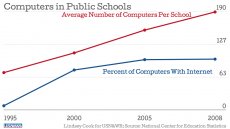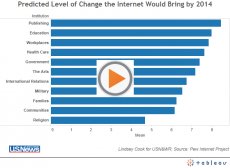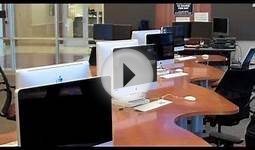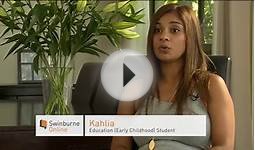Virtual University Classroom online
 This article is part of a series that examines predictions about the future. So far, we've looked at predictions for 2025 and explored 2004 predictions about
This article is part of a series that examines predictions about the future. So far, we've looked at predictions for 2025 and explored 2004 predictions about
Like health, the technological revolution that would disrupt education has been heavy on optimistic predictions, but short on change. Schools still look much the same as when our parents or grandparents attended: teachers stand in the front of classrooms, lecturing on different topics, while students try to pay attention and learn something. What they learn is later tested and grades are awarded based on their improvement or the knowledge learned.
 Computers in schools have skyrocketed in the past two decades and by 2000 most had Internet. Still, the model is much the same, no matter what a student uses to do assignments, take tests or access the library.
Computers in schools have skyrocketed in the past two decades and by 2000 most had Internet. Still, the model is much the same, no matter what a student uses to do assignments, take tests or access the library.
In 2004, experts imagined a different landscape for education by 2014. Here's what they thought and how it has turned out:
Formal education
2004 prediction: Enabled by information technologies, the pace of learning in the next decade will increasingly be set by student choices. In 10 years, most students will spend at least part of their “school days” in virtual classes, grouped online with others who share their interests, mastery and skills.
 Almost 60 percent agreed with this prediction and 18 percent disagreed. Education was also ranked No. 2 for institutions experts thought would be disrupted most by the Internet, behind only news/publishing.
Almost 60 percent agreed with this prediction and 18 percent disagreed. Education was also ranked No. 2 for institutions experts thought would be disrupted most by the Internet, behind only news/publishing.
Despite the lofty predictions, education has been slow to change. Adult education has been the most receptive to change from the Internet, while universities have started adapting on a wide scale in the last few years. K-12 education is the slowest to change.
Culture is largely to blame. Although the technology for all online learning is there, the desire to push all learning online is not. Like health, things have been done a certain way for a long time and turning the ship takes time, especially in K-12 where decision-makers are spread all over the country and have little competition (if any) from other schools.
You might also like





|
Get Your Degree Online Book (McGraw-Hill)
|







